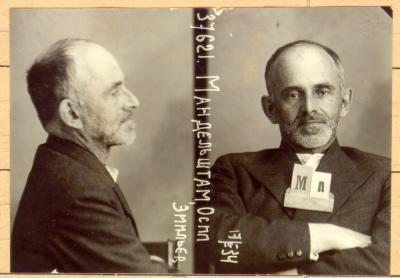The arrival of new Mandelstam translations is an occasion to celebrate the solidity of the poem over the impermanence of the state. American professors who teach this lesson typically load up on theory and philosophy. But in Mandelstam’s world, the theorists – in both government and the arts – pose the lethal threat. Today we often make claims on Mandelstam and glorify his martyrdom without understanding very much about him.
Kevin Platt, a professor of Slavic languages at the University of Pennsylvania, now gives us Modernist Archaist, a selection of 82 translations with an insightful introduction. Half of the poems are drawn from existing collections, including 32 versions by Clarence Brown and W.S. Merwin from their Selected Poems (1974). Platt is the main contributor of new versions here, covering poems from Mandelstam’s Stone (1908-1915), Tristia (1916-1920), the early twenties and early thirties (there was a period of silence between them), and poems from the exile in Voronezh. Here is “Hagia Sophia” from 1912, co-translated with Charles Bernstein:
Hagia Sophia – Lord decreed
Nations and kings shall stop here!
Truly your cupola hangs, in the words of a witness,
As if by a chain from the heavens.
And for the ages, Justinian’s example:
When Diana of Ephesus allowed
One hundred and seven green marble pillars
To be plundered for foreign gods.
But what was your generous maker thinking,
When, in soul and concept high,
He arranged apses and exedrae,
Directing them West and East?
Beautiful temple, bathed in the world,
And forty windows – a triumph of light;
On the spandrels, beneath the cupola, four
Archangels – most beautiful of all.
And the wise, spherical building
Will outlast nations and ages,
And the seraphims’ resonant sobs
Won’t warp dark gilt.
Platt generally follows Brown and Merwin in not attempting the stricter meter and end-rhymes of Mandelstam. Joseph Brodsky famously disparaged these translations, regarded by him as sacrilege, and several other writers and critics have made cases for and against the various translations. My own sense is that the Platt/Bernstein version is sensitive to what we know about Mandelstam’s sensibility and values, and reminds us that Mandelstam thought of the well-made poem as a cathedral, built up stone by stone. The kings stop here and pass on, but the shrine is made of more permanent stuff.
 Yet Osip Mandelstam (1891-1938) has not yet quite come into focus for his English speaking readers. The virtues he stands for, so singular and elevated, have strangely obscured the intentions and expression of his poetry, and the uniqueness of the poet’s mind and stance. In effect, we have known him and his work only recently. His rehabilitation in the U.S.S.R. was officially established in 1956 after Nikita Khrushchev condemned Stalin’s purges of 1936-38. The first edition of his collected poems in Russian was published in New York in 1955. In 1970 Atheneum published Nadezhda Mandelstam’s memoir Hope Against Hope, and her husband’s apotheosis commenced. Bernard Meares (represented in Modernist Archaist,) Burton Raffel, Brown and Merwin, and David McDuff produced some of the first translations in English in the early seventies. The simplified story: He wrote against the state, and the state crushed him. But this portrait is too simple.
Yet Osip Mandelstam (1891-1938) has not yet quite come into focus for his English speaking readers. The virtues he stands for, so singular and elevated, have strangely obscured the intentions and expression of his poetry, and the uniqueness of the poet’s mind and stance. In effect, we have known him and his work only recently. His rehabilitation in the U.S.S.R. was officially established in 1956 after Nikita Khrushchev condemned Stalin’s purges of 1936-38. The first edition of his collected poems in Russian was published in New York in 1955. In 1970 Atheneum published Nadezhda Mandelstam’s memoir Hope Against Hope, and her husband’s apotheosis commenced. Bernard Meares (represented in Modernist Archaist,) Burton Raffel, Brown and Merwin, and David McDuff produced some of the first translations in English in the early seventies. The simplified story: He wrote against the state, and the state crushed him. But this portrait is too simple.
 Mandelstam was first arrested in 1933 after reciting his “Stalin Epigram” around Moscow. Emma Gerstein, an intimate of the Mandelstams, describes Osip’s “manic condition” prior to his detention. Her Moscow Memoirs (Overlook Press, 2004) scandalized Mandelstam devotees by suggesting he unnecessarily invited his persecution and named names during his interrogation, including that of Gerstein whose meticulous narrative seems disinterested in axe-grinding. She also contradicts the rendition of some events in Hope Against Hope — but Nadezhda fired back in her sequel Hope Abandoned: “Emma Gerstein looked on our apartment as a place where she met ‘interesting people’ and unsuccessfully pursued her amorous designs on Lev Gumilyov, Narbut, and whoever else happened to be there, but she paid little attention to M[andelstam] and never understood his poetry.” I would agree with the last part. Moscow Memoirs clarifies and humanizes the Mandelstams’ situation (and the sometimes onerous demands of their friendship) without diminishing the pathos, but Gerstein doesn’t seem to comprehend the deep source of his agitation before the arrest. She writes, “He demanded over the telephone that she [Akhmatova] come back to Moscow … he turned to me, beside himself with irritation: ‘When it comes down to it, we are Acmeists, members of the same party. Her party comrade is in trouble, she’s duty-bound to come!’”
Mandelstam was first arrested in 1933 after reciting his “Stalin Epigram” around Moscow. Emma Gerstein, an intimate of the Mandelstams, describes Osip’s “manic condition” prior to his detention. Her Moscow Memoirs (Overlook Press, 2004) scandalized Mandelstam devotees by suggesting he unnecessarily invited his persecution and named names during his interrogation, including that of Gerstein whose meticulous narrative seems disinterested in axe-grinding. She also contradicts the rendition of some events in Hope Against Hope — but Nadezhda fired back in her sequel Hope Abandoned: “Emma Gerstein looked on our apartment as a place where she met ‘interesting people’ and unsuccessfully pursued her amorous designs on Lev Gumilyov, Narbut, and whoever else happened to be there, but she paid little attention to M[andelstam] and never understood his poetry.” I would agree with the last part. Moscow Memoirs clarifies and humanizes the Mandelstams’ situation (and the sometimes onerous demands of their friendship) without diminishing the pathos, but Gerstein doesn’t seem to comprehend the deep source of his agitation before the arrest. She writes, “He demanded over the telephone that she [Akhmatova] come back to Moscow … he turned to me, beside himself with irritation: ‘When it comes down to it, we are Acmeists, members of the same party. Her party comrade is in trouble, she’s duty-bound to come!’”
The Acmeists were a group of Russian poets who around 1910 began to resist the ideas of the prevailing Symbolist poets. In addition to arguing for a blend of the moral and the intellectual, “Mandelstam felt that the Russian Symbolists rejected the dynamism of the phenomenal world,” writes Stephen Dobyns in Best Words, Best Order. For Mandelstam, a poem was an intentionally built thing, formal in structure. Seamus Heaney described the Acmeist desire “for a return to the things of this world, for a classical and Mediterranean clarity as opposed to the gothic and and northern haze of the Symbolists … a sense of the poem as an animated structure, an equilibrium of forces, an architecture.”
 But by 1933, the Acmeists’ arch-enemies were the Russian Futurists, exemplified by Vladimir Mayakovsky. Mandelstam understood that it was not his uncharacteristically political Stalin poem but a way of thinking about poetry that was under attack. In his introduction to Modernist Archaist, Kevin Platt notes that in the early 1920s, scoffing at Mandelstam’s interest in medieval and Renaissance culture, Trotsky said, “Write about whatever you like! But please do permit the new class, that considers, with some justification, that it has been called to create a new world, to point out to you in any case: it does not make new poets of you to translate the weltanschaung of a medieval instructional tract into the language of the Acmeists.” By the mid-thirties, the sanctioned poets could effectively incite the state to eliminate their competitors. Platt explains:
But by 1933, the Acmeists’ arch-enemies were the Russian Futurists, exemplified by Vladimir Mayakovsky. Mandelstam understood that it was not his uncharacteristically political Stalin poem but a way of thinking about poetry that was under attack. In his introduction to Modernist Archaist, Kevin Platt notes that in the early 1920s, scoffing at Mandelstam’s interest in medieval and Renaissance culture, Trotsky said, “Write about whatever you like! But please do permit the new class, that considers, with some justification, that it has been called to create a new world, to point out to you in any case: it does not make new poets of you to translate the weltanschaung of a medieval instructional tract into the language of the Acmeists.” By the mid-thirties, the sanctioned poets could effectively incite the state to eliminate their competitors. Platt explains:
“Of course, the most important tenet of the Soviet ‘state religion’ remained the absolute novelty of revolutionary society – this was an article of faith that was defended with violence that grew in proportion to its patent inaccuracy. In this light, Mandelstam’s base conception of the necessary interconnection of a revolutionary present with an ever-present, fluid and reinvented past came to seem both prophetic and criminally threatening. Ultimately, persecution of this poet should not be taken simply as the elimination by radical innovators of their ‘natural’ opponent, the archaist. Instead, this was the eradication of a critic who was uniquely equipped to unmask the absurdity of the official conception of revolutionary innovation – by offering in its place a more coherent version than the representatives of the state could themselves imagine.”
The persecution of Mandelstam the Acmeist had the more dynamic effect of making him an utter individualist, even as he frantically beckoned his fellow poet Akhmatova to Moscow for moral support. Mandelstam was driven to find an artistic solution that combined definition of form with expansion of mind and language. As Heaney says, the sense of not belonging “was already present in the child’s awareness of a tension between the ‘Judaic chaos’ of his home and the imperial world of Petersburg.” It was a world of multiple unstable, disintegrating identities and a rising, dispiriting state-imposed identity superimposed on everyone. Mandelstam embraced socialism as a philosophy and integrated it into his idea of “we,” but resisted invasive mystiques and power – including that of the avant-garde opportunists. “Along with the poetry came the power not to obey orders,” Heaney says, and the “Stalin Epigram” became the desperate sound of that power’s proof. So of course, Mandelstam lived at that moment in a “manic condition.”
For all our interest in historicity and sorting poets into affiliations, Mandelstam’s story tells us there are only a few great poets in any age and they stand alone. In “On the Nature of the Word,” Mandelstam wrote, “The theory of progress in literature represents the crudest, most repugnant form of academic ignorance … In literature nothing is ever ‘better’; no progress can be made because there is no literary machine and no finish line toward which everyone must race.” Drawing on classicism, intuiting a unified humanity from which his “providential” listener emerged, and taking on the demands of poetic form and rhetoric head-on, Mandelstam antagonized the approved group-think poets. Perhaps much of his orientation and practice is actually rejected by many contemporary American poets and teachers of poetry who otherwise call him one of their own.
 Mandelstam was ultimately crushed by other poets in the thrall of theory. Think about that the next time you run into a squabble about which “type” of poetry in America is the most politically pure, creative, progressive. Having been alerted by Milosz in The Captive Mind about the damage artists and writers will inflict on each other when power is in the balance, we may be alert for the singular voice that speaks most desperately, disturbingly and eloquently to our age. Nadezhda wrote in Hope Against Hope, “M. defined the poet as one who ‘disturbs meaning.’ What he had in mind, however, was not rebellion against inherited order, but rejection of the commonplace image and the hackneyed phrase by which meaning is obscured.” One has a reason to remain disinterested in the poetry of trivial rebellions, gratuitous political references, facile or overly complicated cranking against inherited order, and the clichéd postures of undeserved entitlements.
Mandelstam was ultimately crushed by other poets in the thrall of theory. Think about that the next time you run into a squabble about which “type” of poetry in America is the most politically pure, creative, progressive. Having been alerted by Milosz in The Captive Mind about the damage artists and writers will inflict on each other when power is in the balance, we may be alert for the singular voice that speaks most desperately, disturbingly and eloquently to our age. Nadezhda wrote in Hope Against Hope, “M. defined the poet as one who ‘disturbs meaning.’ What he had in mind, however, was not rebellion against inherited order, but rejection of the commonplace image and the hackneyed phrase by which meaning is obscured.” One has a reason to remain disinterested in the poetry of trivial rebellions, gratuitous political references, facile or overly complicated cranking against inherited order, and the clichéd postures of undeserved entitlements.
This poem from 1931, when Mandelstam was emerging from a long period of silence, was translated by Merwin and Brown. Here, it becomes obvious that years of slander and slyness by his detractors had shoved Mandelstam out into the open where his options as a poet were compressed into a single, resistant utterance.
I saw the world of power through a child’s eyes –
oysters frightened me, I looked bashfully at the sentries –
I owe it not one jot of my soul:
something alien to me, which I never wanted.
I never stood under the bank’s Egyptian porch,
stupidly pompous, in a beaver mitre, glowering.
Never, never, above the lemon Neva, to the rustle
of hundred rouble notes, did a gypsy girl dance for me.
Feeling executions on the way, I escaped from the roar
of rebellious events, to the Nereids on the Black Sea,
and from those days’ beautiful women, gentle European women,
what anguish I consumed, what torment!
Why then does this city, even now, satisfy
my thoughts and my feelings at home in its ancient night?
It is more insolent than ever with its frost and fires,
more arrogant, damned, empty – it looks younger.
Maybe that’s because, in a child’s picture book,
I saw Lady Godiva draped in her red mane,
And I’m still whispering under my breath
Good-bye, Lady Godiva … Godiva, I’ve forgotten …
[Published by Whale and Star on December 2007, 160 pp., $18.95 paperback. Distributed by University of Nebraska Press.]
Modernist Archaist
Thanks for this review, so illuminating re Mandelstam’s sensibility and the forces that ended his life. My sense from reading Brodsky is that he felt Merwin’s (and others) translation failed to capture OM’s voice: ‘nervous, high-pitched pure . . . — a voice trembling, perhaps, like a match burning in a high wind, yet utterly unextinguishable.’ Perhaps Brodsky felt that OM’s voice is essential to, and inseparable from, his sensibility — which could account for OM’s not coming ‘into focus for his English speaking readers,’ if translations do not capture that voice.